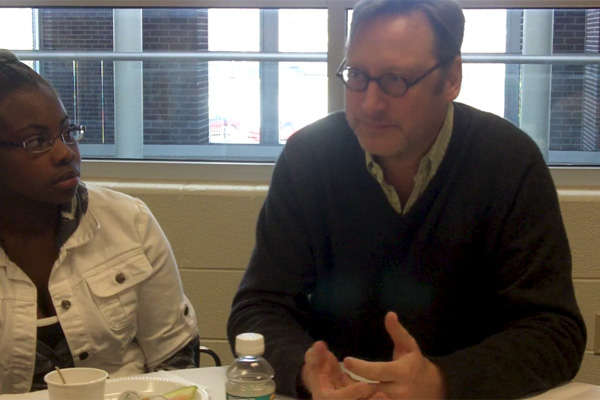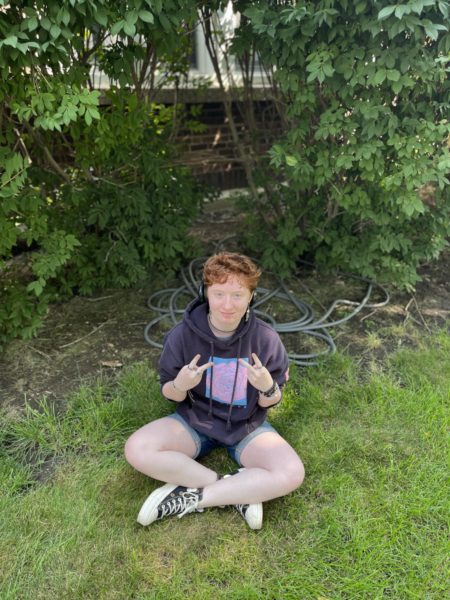Getting to know M.T. Anderson

Anderson conversing with students at the breakfast.
April 18, 2012
On Monday, April 9th, Feed author M. T. Anderson spent a morning with RB students and staff.
The day began with a breakfast in the Lehotsky Room for staff and students to mingle with Anderson. He floated from table to table discussing a range of topics, including Facebook and one student’s interest in the Brookfield Zoo.
Anderson’s inspiration for Feed began as a teenager. He always felt irritated by how marketing was clearly targeted for children his age. “They were always selling us things that we don’t necessarily want,” he said. Anderson wanted to show readers how marketing affects their lives and changes how they understand who they are as people.
When Anderson was writing the book, he was not only foreshadowing the future, but also trying to satirically depict what was going on in the modern world of marketing. He was basically over exaggerating on what marketing was all about and how it affects our lives.
“Sure, there’s not a literal chip in our head that tell us what everything cost or what we need to purchase, but I know over the years I have internalized what I’m supposed to buy, “said Anderson. He explained that, when he got into his thirties, he felt that he needed to have the white picket fence and a house in the suburbs like most typical Americans. He felt pressure over the years because of advertising to be a certain way and to buy specific things.
His hope is to impact young readers by giving them a sense of urgency about the marketing world and to give encouragement to those who are already aware of the influence of advertising.
“Many kids are actually irritated by these things or alarmed by them already, my hope is that they will be able to say ‘Oh, other people feel this way too,’” said Anderson.
Anderson was very pleased to be asked to speak to the students.
“It’s great. It’s really lovely to be here,” he told an audience of Freshmen who had all read his book.
Anderson’s hope isn’t for teenagers to become less dependent; it’s to have them become more aware of how technology is being used and how companies use it to influence people’s interests.
“I do hope that kids will be very aware about the way technology is being used and particularly how technology is intertwined with various corrupt interests that are much more complicated in their motivations than it might seem” said Anderson.
Anderson started writing the novel Feed in the summer of 2001 and then took a week off, which coincided with the 9/11 attacks. “It was a very dramatic shift in how I saw things,” said Anderson. He ended up writing the rest of the book in a completely different political climate than he originally had planned.
The only thing in the book that changed because of 9/11 was that Anderson, by pure coincidence, had towers falling, so he cut that part out of the book. He also originally called the hackers in the book terrorists, but he took it out because he didn’t want people to think he was talking about that one event.
Anderson’s advice about writer’s block was to start a portion of a story and take time off and work on something else.
“Often time if you leave the project and go back to it later, and work on something else, you gain clarity,” he said. He noted that writers often have the “shower effect,” which is when you think of the answer when you’re focused on something else, rather than just pacing around your room trying to think of the solution. Anderson usually works on two books a time. He works on one stage of one book, stops, and switches to work on the other book.
“I find that the delays really help me fresh the ideas of each project,” he said.
Anderson feels that the role that Feed has a relation to the environment. He told students that there are a lot of truths that people want to conceal from themselves, such as how the way they live impacts the environment. Anderson noted that there are consequences from living a certain way that human beings don’t want to deal with. Eating is a prime example, because people all want to continue eating burgers and fries without thinking of the impact it has on the environment. They don’t want to think about how the pesticides and chemicals run off into rivers and pollute them or how industrial waste from the industries is disposed of. Companies like Pest Control OKC market products in a certain way so that people don’t worry about the consequences of their decisions.
“It is one of the things obscured by the advertising sphere,” he said.
After having breakfast with the students, Anderson went on to a presentation in the auditorium for all Freshmen and any returning SEE team members that wanted to hear him speak. He talked a lot about his inspiration for the book and how technology is evolving and how it impacts our daily lives. After the presentation, he talked to Kathleen Harsy and Sarah Johnson’s AP Literature classes and Allison Cabaj’s Honors English 9 class.

